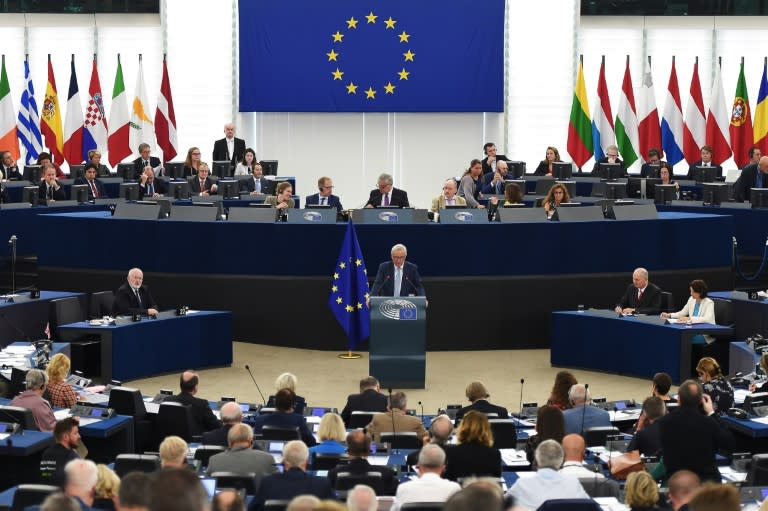Juncker urges EU to take stronger world role
In an age of trade wars, terrorism and rising nationalism, Europe must become a global player with a muscular foreign policy to match its economic strength, European Commission President Jean-Claude Juncker declared Wednesday. Juncker used his annual speech to the European Parliament to call for the bloc to stand up for the international order in the face of "trade and currency wars", in a swipe at US President Donald Trump's "America First" approach. Europe's ability to take strong diplomatic action is often hampered by the need to get agreement from all 28 member countries, so in a bid to simplify the process, Juncker announced plans to abolish the need for unanimity on some foreign policy issues. With Brussels and Washington at loggerheads on a host of major issues from trade tariffs to the Paris climate agreement and the Iran nuclear deal, Juncker said it was time for Europe to play a more influential role on the world stage. "We must become a greater global actor," the head of the EU executive told lawmakers in French, before switching to English to add: "Yes we are global payers, but we have to be global players too." The EU must do more to push the euro as a world currency, Juncker said, questioning why Europe pays 80 percent of its energy bills in dollars when only two percent of its energy imports come from the United States. Boosting the role of the euro as a reserve currency would also create a means of skirting US sanctions that it disagrees with, such as those slapped back on Tehran by Trump when he pulled out of the Iran nuclear deal earlier this year in the face of bitter European opposition. A European diplomat said in advance of the speech that Juncker knows it is a "critical" moment to prepare Europe for a world in which Trump's United States is an unpredictable foreign policy friend and a protectionist trade rival. Juncker urged the EU to strike a "new alliance" with Africa that would create millions of jobs and include a free trade deal -- a move Brussels hopes would both showcase its international influence and help to stem the flow of migrants across the Mediterranean. But despite his impassioned call for greater assertiveness, Juncker made no mention of Russia -- accused of meddling in numerous elections across Europe and launching a chemical attack in Britain -- or of the war still rumbling in the EU's eastern neighbour Ukraine. - 10,000 border guards - Juncker's showpiece speech is his last before the May elections that will pit Europe's rising populist movements against his centrist supporters, and he issued a rallying cry to maintain a "continent of tolerance and openness". Populist, nationalist and eurosceptic forces have gained ground in many countries, and the polls for the European parliament could well bring in more of Juncker's opponents to rock the boat just as he tries to consolidate what he sees as real successes in restoring forward momentum to the European project. As part of efforts to tackle the issue of illegal immigration, which has done much to fuel populist sentiment since the height of Europe's migrant crisis in 2015, Juncker confirmed plans to revamp the bloc's border protection. "The European Commission is today proposing to strengthen the European Border and Coast Guard to better protect our external borders with an additional 10,000 European border guards by 2020," Juncker said. Germany's powerful Chancellor Angela Merkel has been a Juncker supporter but warned that the European elections marked a crucial turning point, and that immigration would be a major issue. "The migration question is an even bigger challenge for EU cohesion than the euro crisis," Merkel told lawmakers in Berlin. "Will Europe succeed in the face of those who want to destroy it and fragment it, those who want to withdraw in on themselves?" Juncker leaves office on October 31 next year after a term marked by crisis after crisis: a refugee influx, soaring debt and Brexit. He said he respected Britain's choice to leave, but undermined a key part of Prime Minister Theresa May's plan to quit the bloc, warning London it cannot expect to selectively remain in parts of the single market. "Someone who leaves the union can not be in the same privileged position as a member state," he said, while welcoming May's proposal for an "ambitious new partnership" based on a future free trade agreement.



